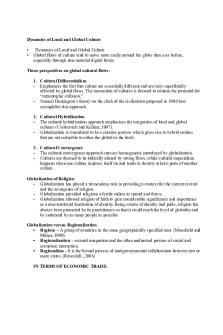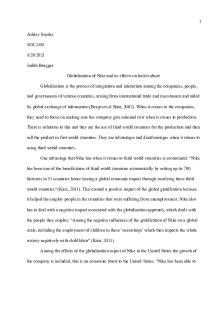Dynamics of Local and Global Culture PDF

| Title | Dynamics of Local and Global Culture |
|---|---|
| Author | Jessica Cousino |
| Course | Social Science |
| Institution | Monroe Community College |
| Pages | 3 |
| File Size | 123 KB |
| File Type | |
| Total Downloads | 110 |
| Total Views | 162 |
Summary
Dynamics of Local and Global Culture...
Description
Dynamics of Local and Global Culture • •
Dynamics of Local and Global Culture Global flows of culture tend to move more easily around the globe than ever before, especially through non-material digital forms.
Three perspectives on global cultural flows: 1. Cultural Differentialism - Emphasizes the fact that culture are essentially different and are only superficially affected by global flows. The interaction of cultures is deemed to contain the potential for “catastrophic collision.” - Samuel Huntington’s theory on the clash of the civilization proposed in 1996 best exemplifies this approach. 2. Cultural Hybridization - The cultural hybridization approach emphasizes the integration of local and global cultures (Cvetkovich and Kellner, 1997). - Globalization is considered to be a creative process which gives rise to hybrid entities that are not reducible to either the global or the local. 3. Cultural Convergence - The cultural convergence approach stresses homogeneity introduced by globalization. - Cultures are deemed to be radically altered by strong flows, while cultural imperialism happens when one culture imposes itself on and tends to destroy at least parts of another culture. Globalization of Religion - Globalization has played a tremendous role in providing a context for the current revival and the resurgence of religion. - Globalization provided religions a fertile milieu to spread and thrive. - Globalization allowed religion of faith to gain considerable significance and importance as a non-territorial touchstone of identity. Being source of identity and pride, religion has always been promoted by its practitioners so that it could reach the level of globality and be embraced by as many people as possible Globalization versus Regionalization • Regions – A group of countries in the same geographically specified area. (Mansfield and Milner, 1999) • Regionalization – societal integration and the often undirected process of social and economic interaction. • Regionalism - It is the formal process of intergovernmental collaboration between two or more states. (Ravenhill , 2008) IN TERMS OF ECONOMIC TRADE:
REGIONALIZATION
GLOBALIZATION
•
It is the process of dividing an area into small segments called regions. (EX: Division of nation into states or provinces)
•
Promotes the integration of economies across the state borders all around the world.
•
Regionalization can also be used by local markets as a management tool as it monopolizes companies within a certain region.
•
Allows many corporations to trade on an international level so it allows a free marketing system.
IN TERMS OF CULTURAL AND SOCIETAL RELATIONS: REGIONALIZATION •
Does not support multi-culturalism.
•
Regionalized communities do not get involved in the affairs of other areas.
•
Regionalized countries rarely have that advancement.
GLOBALIZATION •
Accelerates multi-culturalism by free and inexpensive movement of people.
•
International communities are more willing to come to the aid of a country stricken by a natural disaster.
•
Globalized countries share great advancements in technology to others.
WHY WAS THERE A RIFT BETWEEN GLOBALIZATION AND REGIONALIZATION? 1. According to a 2007, The Financial Times revealed that majority of Europeans consider that globalization brings negative effects to their societies. 2. The threats of an “ungoverned globalization” can be countered with a managed globalization which refers to all attempts to make globalization more palatable to citizens. (Jacoby and Meunier, 2010) 3. According to this, regionalization and the development of interregionalism would become a global nature. 4.
Regionalization in some parts of the world encourages regionalization elsewhere – whether by limitation, like the success of the European Single Market.
5.
“The new regionalism is not a barrier to political globalization, but on the contrary, entirely compatible with it – if not an indirect encouragement.” - (Held et al., 2005)
REGIONALIZATION AND REGIONALISM - According to Hurrell (2007) Regionalism is seen as critical part of the political economy of globalization and the strategies that states (and other actors) have adopted in the face of globalization… The emergence of regionalism needs to be understood within the global restructuring of power and production. The many worlds are closely intertwined with the character and fate of the one. The core driving force is global even if the manifestation is regional. Factors for Regionalization & Regionalism 1. The motivations for the recent regionalization in Asia is a global thing. It is a complex mixture of factors such as concern of security to ensure peace and stability as confidence building can be enhanced through economic cooperation within a region. 2.
According to Huntington (1996) , culture and identity guide regionalization as they are part of a civilization. He defined 9 major civilizations: Western, Latin American, African, Islamic, Sinic, Hindu, Orthodox, Buddhist, and Japanese.
3.
Economic motivations are the main motivations behind contemporary regionalization. (De Martino and Grabel, 2003)....
Similar Free PDFs

Local Culture of Bicol
- 11 Pages

Global competitive dynamics
- 2 Pages

Activity 10.1 Global culture
- 3 Pages

Global Culture II - Activity 1
- 2 Pages

Culture and Customs of Indonesia
- 265 Pages
Popular Institutions
- Tinajero National High School - Annex
- Politeknik Caltex Riau
- Yokohama City University
- SGT University
- University of Al-Qadisiyah
- Divine Word College of Vigan
- Techniek College Rotterdam
- Universidade de Santiago
- Universiti Teknologi MARA Cawangan Johor Kampus Pasir Gudang
- Poltekkes Kemenkes Yogyakarta
- Baguio City National High School
- Colegio san marcos
- preparatoria uno
- Centro de Bachillerato Tecnológico Industrial y de Servicios No. 107
- Dalian Maritime University
- Quang Trung Secondary School
- Colegio Tecnológico en Informática
- Corporación Regional de Educación Superior
- Grupo CEDVA
- Dar Al Uloom University
- Centro de Estudios Preuniversitarios de la Universidad Nacional de Ingeniería
- 上智大学
- Aakash International School, Nuna Majara
- San Felipe Neri Catholic School
- Kang Chiao International School - New Taipei City
- Misamis Occidental National High School
- Institución Educativa Escuela Normal Juan Ladrilleros
- Kolehiyo ng Pantukan
- Batanes State College
- Instituto Continental
- Sekolah Menengah Kejuruan Kesehatan Kaltara (Tarakan)
- Colegio de La Inmaculada Concepcion - Cebu










